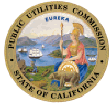 California Public Utilities Commission
California Public Utilities Commission
505 Van Ness Ave., San Francisco
_________________________________________________________________________________FOR IMMEDIATE RELEASE PRESS RELEASE
Contact: Terrie Prosper, 415.703.1366, news@cpuc.ca.gov Docket #: Res T-17232
CPUC APPROVES CONDITIONAL GRANT TO
IMPROVE BROADBAND SERVICE TO UNDERSERVED REGIONS OF MONO, INYO, EASTERN KERN, AND EASTERN SIERRA
SAN FRANCISCO, December 3, 2009 - The California Public Utilities Commission (CPUC), in its ongoing efforts to bridge the digital divide and boost economic development, today conditionally approved a grant of $19, 294,717 from the California Advanced Services Fund (CASF) for the Digital 395 Middle Mile Project of the California Broadband Cooperative (CBC).
The amount granted represents 19 percent of the total project costs of $101,494,218 and is contingent on approval for an 80 percent matching grant from the federal Broadband Technology Opportunities Program stimulus portion of the American Recovery and Reinvestment Act (ARRA). The CBC will not be reimbursed by the CASF until the CPUC reviews the expenses associated with the project.
The CBC Digital 395 project would consist of a 448 mile, 10 gigabit high-capacity fiber optic middle mile/backhaul route along U.S. Highway 395 from Barstow to Topaz Lake at the Nevada state line to bring high-speed Internet broadband to underserved communities and anchor institutions in Mono, Inyo, eastern Kern, and northwest San Bernardino Counties of California's eastern Sierra region.
California's Eastern Sierra region is described in the project application as "a high cost, rural area" that telecommunications carriers have been "unwilling to invest in because of high construction cost and small market size when compared to larger urban areas. As a result, economic development has suffered and where broadband service is available, its residents pay some of the highest prices in the state."
"Broadband is critical to consumers in rural areas where people are more isolated," commented Commissioner Rachelle Chong. "With one fell swoop, the Digital 395 project will connect entire regions of California that were limited to slow or no broadband connectivity."
The CBC Digital 395 project will create local points of wholesale interconnection for broadband Internet service providers potentially serving 28,127 households, 2,571 businesses, and 209 community and public anchor institutions, including 74 educational, 12 health care, 11 libraries, 26 public safety entities, municipal utilities, two military bases, courthouses, and regional Federal offices for the Bureau of Land Management and the U.S. Forest Service. The project will also help increase the number and proportion of broadband users in the eastern Sierra region of the state, which has a low penetration rate.
The Digital 395 Project will create more than 1,100 jobs. Specifically, 706 direct and indirect jobs and 397 induced jobs as calculated under the ARRA guidelines.
The scope and scale of this project present a once in a lifetime opportunity to connect an entire region of the state to the digital "information superhighway", the CPUC determined. The project sponsor, CBC, a member-owned cooperative, was created from a community consensus led by the elected leadership of California's Eastern Sierra Counties, to establish a telecommunications alternative for the area. The fiscal agent for the project is Inyo Networks, Inc., a CBC member.
Once constructed, the Digital 395 Network will be owned and operated by CBC. Membership in CBC is open to all wholesale level customers and prospective members are required purchase facilities or services in order to join. Potential cooperative members are government, education, and medical agencies, telephone, wireless, cable television, and Internet service providers.
On July 9, 2009, the CPUC established a new schedule for filing, review, and approval of CASF broadband fund applications to allow project sponsors to simultaneously apply for an 80 percent match from the Broadband Technology Opportunities Program in the federal stimulus act.
On December 20, 2007, the CPUC established the two-year, $100 million CASF to provide 40 percent matching infrastructure grants to broadband providers willing to put up the matching 60 percent of funds and to serve the nearly 2,000 California communities that are currently unserved and underserved by broadband.
Of that $100 million, $38,148,080 in broadband infrastructure grants has so far been approved.
Today's adopted Resolution brings the total to $57,442,797. Applications for CASF grants are still being accepted by the CPUC.
For information on the Governor's Broadband Taskforce, please visit www.calink.ca.gov/taskforce/aboutus.asp.
For more information on communications issues, please visit www.CalPhoneInfo.com.
For more information on the CPUC, please visit www.cpuc.ca.gov.
###
